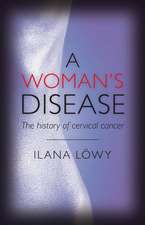Cancer Clinical Trials: Proactive Strategies: Cancer Treatment and Research, cartea 132
Editat de Stanley P. L. Leongen Limba Engleză Hardback – 9 noi 2006
| Toate formatele și edițiile | Preț | Express |
|---|---|---|
| Paperback (1) | 1096.62 lei 6-8 săpt. | |
| Springer Us – 22 oct 2016 | 1096.62 lei 6-8 săpt. | |
| Hardback (1) | 1105.04 lei 6-8 săpt. | |
| Springer Us – 9 noi 2006 | 1105.04 lei 6-8 săpt. |
Din seria Cancer Treatment and Research
- 5%
 Preț: 1103.03 lei
Preț: 1103.03 lei - 5%
 Preț: 726.32 lei
Preț: 726.32 lei - 5%
 Preț: 787.58 lei
Preț: 787.58 lei - 5%
 Preț: 1037.93 lei
Preț: 1037.93 lei - 5%
 Preț: 1032.64 lei
Preț: 1032.64 lei - 5%
 Preț: 1041.77 lei
Preț: 1041.77 lei - 5%
 Preț: 917.42 lei
Preț: 917.42 lei - 5%
 Preț: 719.02 lei
Preț: 719.02 lei - 5%
 Preț: 920.18 lei
Preț: 920.18 lei - 5%
 Preț: 1040.88 lei
Preț: 1040.88 lei - 5%
 Preț: 721.19 lei
Preț: 721.19 lei - 15%
 Preț: 700.10 lei
Preț: 700.10 lei - 5%
 Preț: 370.38 lei
Preț: 370.38 lei - 5%
 Preț: 2116.84 lei
Preț: 2116.84 lei - 5%
 Preț: 1414.08 lei
Preț: 1414.08 lei - 5%
 Preț: 1424.16 lei
Preț: 1424.16 lei - 5%
 Preț: 1106.69 lei
Preț: 1106.69 lei - 5%
 Preț: 1297.62 lei
Preț: 1297.62 lei - 5%
 Preț: 1103.22 lei
Preț: 1103.22 lei - 5%
 Preț: 1094.44 lei
Preț: 1094.44 lei - 5%
 Preț: 1096.45 lei
Preț: 1096.45 lei - 5%
 Preț: 1413.56 lei
Preț: 1413.56 lei - 5%
 Preț: 720.10 lei
Preț: 720.10 lei - 5%
 Preț: 706.77 lei
Preț: 706.77 lei - 5%
 Preț: 731.07 lei
Preț: 731.07 lei - 5%
 Preț: 1414.80 lei
Preț: 1414.80 lei - 5%
 Preț: 1108.72 lei
Preț: 1108.72 lei - 5%
 Preț: 1098.12 lei
Preț: 1098.12 lei - 5%
 Preț: 1092.22 lei
Preț: 1092.22 lei - 5%
 Preț: 1099.56 lei
Preț: 1099.56 lei - 5%
 Preț: 1106.33 lei
Preț: 1106.33 lei - 5%
 Preț: 1096.81 lei
Preț: 1096.81 lei
Preț: 1105.04 lei
Preț vechi: 1163.20 lei
-5% Nou
Puncte Express: 1658
Preț estimativ în valută:
211.44€ • 221.36$ • 174.96£
211.44€ • 221.36$ • 174.96£
Carte tipărită la comandă
Livrare economică 05-19 aprilie
Preluare comenzi: 021 569.72.76
Specificații
ISBN-13: 9780387332246
ISBN-10: 0387332243
Pagini: 318
Ilustrații: XX, 320 p.
Dimensiuni: 156 x 235 x 24 mm
Greutate: 0.69 kg
Ediția:2007
Editura: Springer Us
Colecția Springer
Seria Cancer Treatment and Research
Locul publicării:New York, NY, United States
ISBN-10: 0387332243
Pagini: 318
Ilustrații: XX, 320 p.
Dimensiuni: 156 x 235 x 24 mm
Greutate: 0.69 kg
Ediția:2007
Editura: Springer Us
Colecția Springer
Seria Cancer Treatment and Research
Locul publicării:New York, NY, United States
Public țintă
Professional/practitionerCuprins
Historical Perspective and Evolving Concerns for Human Research.- Cancer Trials and the Institutional Review Board (IRB).- NCI’s Cancer Therapy Evaluation Program: A Commitment to Treatment Trials.- The Role of the FDA in Cancer Clinical Trials.- The Role of Cooperative Groups in Cancer Clinical Trials.- The Advocate Role in Clinical Study Development and Partnering with Patient Advocates in Your Local Institution.- The National Breast Cancer Coalition: Setting the Standard for Advocate Collaboration in Clinical Trials.- The Role of the Principal Investigator in Cancer Clinical Trials.- The Audit Process and How to Ensure a Successful Audit.- The Privacy Rule (HIPAA) as it Relates to Clinical Research.- The Commission on Cancer, American College of Surgeons’ Response to HIPAA.- Ethical and Legal Issues in the Conduct of Cancer Clinical Trials.- The Role of the Office of Research Integrity in Cancer Clinical Trials.- Strategies for the Administration of a Clinical Trials Infrastructure: Lessons from a Comprehensive Cancer Center.- The Clinical Research Process: Building a System in Harmony with its Users.- Cancer Research and Clinical Trial in Action: An Important Exercise Before You Embark on Your Study.
Textul de pe ultima copertă
Foreword written by Samuel A. Wells, Jr., MD
Professor of Surgery
Duke University Medical Center, Durham, NC
According to the American Cancer Society, about 1 million persons in the United States will be diagnosed with solid cancer every year. About 50% of them will be potentially cured by surgery. The other half of the population may develop metastatic cancer. To date, there is no systemic treatment available to cure metastatic cancer. Therefore, cancer clinical trials are critical to evaluate reliable treatment modalities against metastatic cancer. Likewise, adjuvant trials are needed to prevent high risk patients from developing recurrence following definitive surgical resection of their cancer. Only about 3-5% of the adult cancer patients are enrolled in clinical trials. When the pediatric cancer clinical trial groups were able to accrue over 40 percent of eligible patients to their clinical trials, significant impact was made on the survival of these pediatric cancer patients. However, multiple barriers exist to block adult cancer patients from entering into clinical protocols. The ever-changing regulations for clinical trials and the ethical dilemma of treating cancer patients as subjects have made it ever so difficult for the principal investigators to conduct clinical research, especially when they are often ill-informed of the complex nature of the regulations and over-worked. Therefore, cancer clinical trials are at a critical junction. The objective of this book is to bring the issues of cancer clinical trials into focus so that proactive strategies may be developed to make such trials more user-friendly. Ultimately, the cancer patients will be benefited.
"Clinical trials remain the most important vehicle for improving the care of cancer patients. This text presents the fundamental components and challenges involving clinical investigations. Leading experts discuss the critical issues covering the spectrum of important topicsfrom planning to application."
Steven T. Rosen, M.D.
Series Editor
Professor of Surgery
Duke University Medical Center, Durham, NC
According to the American Cancer Society, about 1 million persons in the United States will be diagnosed with solid cancer every year. About 50% of them will be potentially cured by surgery. The other half of the population may develop metastatic cancer. To date, there is no systemic treatment available to cure metastatic cancer. Therefore, cancer clinical trials are critical to evaluate reliable treatment modalities against metastatic cancer. Likewise, adjuvant trials are needed to prevent high risk patients from developing recurrence following definitive surgical resection of their cancer. Only about 3-5% of the adult cancer patients are enrolled in clinical trials. When the pediatric cancer clinical trial groups were able to accrue over 40 percent of eligible patients to their clinical trials, significant impact was made on the survival of these pediatric cancer patients. However, multiple barriers exist to block adult cancer patients from entering into clinical protocols. The ever-changing regulations for clinical trials and the ethical dilemma of treating cancer patients as subjects have made it ever so difficult for the principal investigators to conduct clinical research, especially when they are often ill-informed of the complex nature of the regulations and over-worked. Therefore, cancer clinical trials are at a critical junction. The objective of this book is to bring the issues of cancer clinical trials into focus so that proactive strategies may be developed to make such trials more user-friendly. Ultimately, the cancer patients will be benefited.
"Clinical trials remain the most important vehicle for improving the care of cancer patients. This text presents the fundamental components and challenges involving clinical investigations. Leading experts discuss the critical issues covering the spectrum of important topicsfrom planning to application."
Steven T. Rosen, M.D.
Series Editor
Caracteristici
Foreword by Samuel A. Wells, Jr., MD, Professor of Surgery, Duke University Medical Center, Durham, NC, former Director of the American College of Surgeons and Founder of the American College of Surgeons Oncology Group Includes supplementary material: sn.pub/extras











